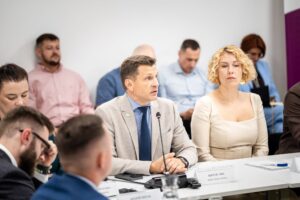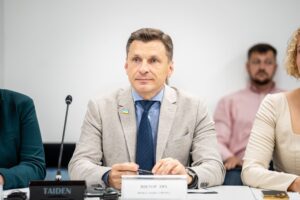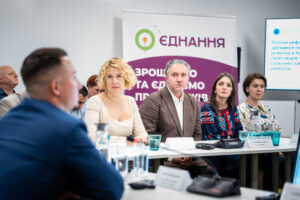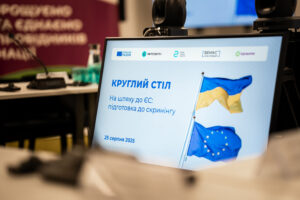
25 серпня відбулася консультативна зустріч між Міністерством розвитку громад та територій України та організаціями громадянського суспільства, а також міжнародними партнерами, у межах підготовки до скринінгу з Європейською Комісією за переговорним розділом 22 Регіональна політика та координація структурних інструментів.
Переговорний розділ 22 «Регіональна політика та координація структурних інструментів» (Regional Policy and Coordination of Structural Instruments) – це частина переговорного процесу щодо вступу України до Європейського Союзу, яка стосується регіональної політики та управління структурними фондами ЄС. Це один із ключових розділів, що має бути узгоджений з ЄС у межах підготовки до членства.

Він охоплює питання, пов’язані з регіональною політикою ЄС, зокрема політикою згуртованості (cohesion policy), а також правила і практики використання структурних та інвестиційних фондів ЄС. Йдеться про механізми, що спрямовані на вирівнювання розвитку між більш і менш розвиненими регіонами, забезпечення інституційної спроможності держави для ефективного управління та прозорого використання цих коштів, а також створення систем контролю й моніторингу.
«Консультації з громадянським суспільством у межах євроінтеграційного щляху — це процес. Я щиро радію, що ця дискусія була фаховою та структурованою. Цей майданчик може стати цінною експертною підтримкою для Міністерства», — зазначила Наталія Старостенко, менеджерка сектору регіонального та місцевого розвитку Представництва ЄС в Україні.

Під час події обговорили стан підготовки до скринінгу та роль громадянського суспільства у процесі європейської інтеграції, розглянули досвід Польщі від Міністерства розвитку фондів та регіональної політики.
«Для України переговорний розділ 22 є одним із ключових, адже саме він визначає, наскільки ми готові інтегрувати європейські стандарти регіональної політики та механізми координації структурних інструментів. Ми вибудовуємо системну підготовку до скринінгу, і участь громадянського суспільства та партнерів робить цей процес більш якісним і змістовним. Наше завдання – забезпечити, щоб європейська інтеграція була відчутною не лише на рівні держави, а й у кожній громаді», – відзначив Олексій Рябикін, заступник Міністра розвитку громад та територій України.

Серед учасників заходу – як представники українських ОГС – експерти ІСАР Єднання, Фонду Східна Європа, Інституту економічних досліджень та політичних консультацій, ЦЕДЕМ, УНЦПД, ЗУРЦ, Центру якості місцевого самоврядування, Асоціації об’єднаних територіальних громад та інші; так і міжнародні партнери – Консультативна місія Європейського Союзу в Україні (EUAM); Центр підприємництва, МСП, регіонів і міст (CFE), Організації економічного співробітництва та розвитку (OECD); Офісу польсько-українського розвитку Міністерства фондів розвитку та регіональної політики Республіки Польща; представники програми U-LEAD з Європою, Офісу звʼязку ОЕСР з Україною.
«Ми раді долучатися до таких консультацій та розуміємо цінність залучення різних секторів для успішного євроінтеграційного процесу. Фонд Східна Європа працює пліч-о-пліч і з державою, і з громадянським суспільством, і з міжнародними партнерами. Лише завдяки взаємодії та чесній розмові можна упроваджувати дієві зміни – і на національному рівні, і на рівні громад», – наголосив Віктор Лях, президент Фонду Східна Європа.

У процесі дискусії учасники та учасниці представили результати різних досліджень та опитувань щодо готовності ОГС брати участь у євроінтеграційних процесах, досвід та виклики, що стоять перед громадами на шляху до євроінтеграції.
«Наші щорічні дослідження стану громадянського суспільства засвідчують: у воєнний період понад 80% організацій продовжують виконувати свою місію, зберігають експертність і залишаються рушійною силою розвитку громад та покращення якості життя людей. Ця тенденція лише посилюється в контексті євроінтеграційного шляху України. Саме тому ми продовжуємо підтримувати та адвокатувати діяльність організацій громадянського суспільства – як на рівні громад, так і в масштабі всієї країни», – підкреслив Володимир Шейгус, виконавчий директор ІСАР Єднання.

Захід відбувся у межах проєктів «Фенікс: Сила спільнот», що реалізує Фонд Східна Європа за підтримки Європейського Союзу, та «Єднання для громади», що впроваджує ІСАР Єднання також за підтримки Європейського Союзу. Круглий стіл організований у партнерстві з Міністерством розвитку громад та територій України.
